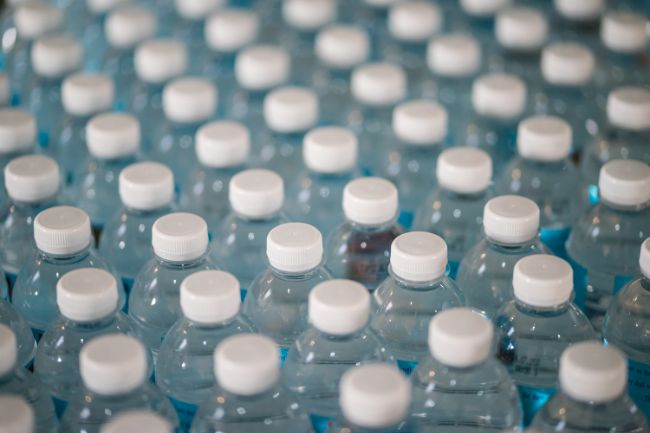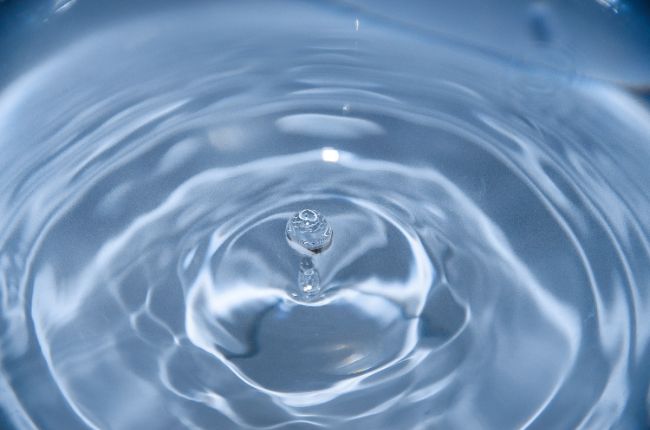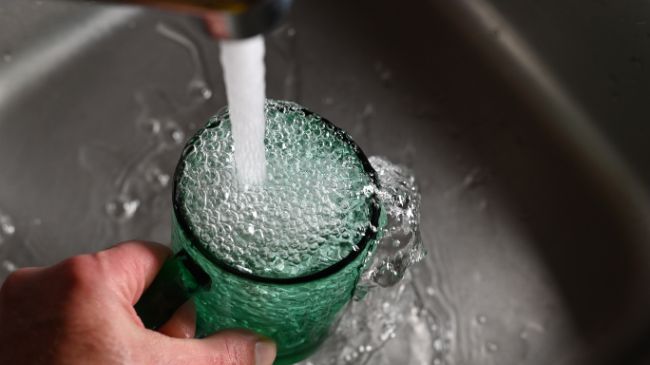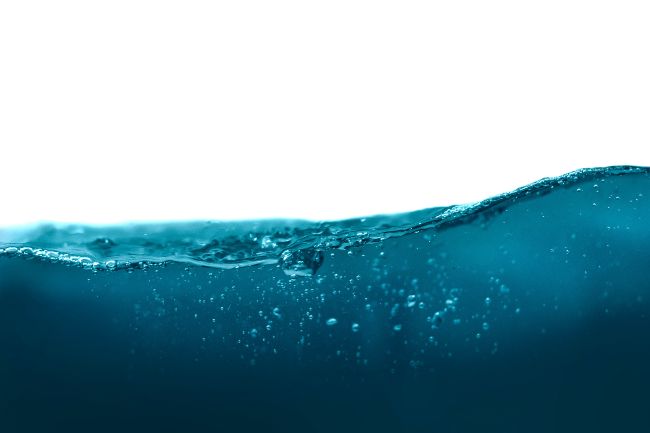Who knew that figuring out what kind of water to use for beer brewing would be so complicated? It turns out bottled spring water is best for your home brews.
How come? Read on to find out as we go through all types of readily available water types.
Brewing beer can be a finicky process, and it is, after all, made of 90%-95% water. That’s why choosing the right kind of water is crucial.
In this post, we’ll get to the bottom of this question to definitively know, once and for all, what the best water for brewing beer is.

Why Water Matters So Much In Beer Brewing
In the past, the water supplies of eight European cities played a crucial role in the development of radically different beer types. Why?
The various components in their water supplies reacted differently from the other components of beer (malt, hops, and yeast). Different types of water are appropriate for different styles of brewing.
However, these days, the majority of brewers now treat their water, and virtually any style may be brewed anywhere.
pH
A good brewing cycle depends on the acidity of the water. The brewer can quickly determine how acidic the mash is by testing its pH.
Seven is regarded as neutral on the pH scale, which ranges from one (the most acidic) to 14 (the most basic).
The enzymes that transform malt starches into sugars function best within a relatively small pH range, roughly 5.2 to 5.5. That’s why maintaining the ideal pH is essential.
Minerals
The presence of minerals in the water, which have an impact on pH, is mainly determined by the local geology.
For instance, it is more likely to gather up alkaline chemicals that neutralize acids in locations with limestone.
Water that has a pH of 8.5 or higher is considered “hard” or higher alkaline. In areas with more volcanic rock, fewer minerals are absorbed, resulting in water that is more acidic or “soft,” with a pH under 6.5.
Consistency can be challenging when using just “natural” sources because other factors, such as severe rain or snowmelt, might enter the picture. This applies even when filtered through a municipal supply.
Brewers must be aware of the type of water they are using. But don’t let this intimidate you.
Broad principles are fine for home brewing, and you don’t need to be so meticulous about precise calculations.
The most important factor is water quality. Brewing water should be devoid of contaminants like germs.
Minerals in Hard Water vs. Soft Water

So, what’s the deal with hard and soft water? Either one can be preferable to another, depending on the type of beer you want to produce.
The ratio of calcium to magnesium determines how hard water is. Of course, hard water has high amounts of those dissolved materials.
In contrast, soft water typically contains more sodium and potassium.
Each of these ingredients has a unique impact on your brew, and none of them are particularly harmful when used in moderation.
Your water’s high sodium content will give your beer a salty, oceanic flavor. An excess in magnesium can cause water to taste a little tangy.
Here are the beer styles associated with hard water and soft water:
Hard Water (Darker, richer brews)
- Stouts
- Porters
- Dubbels
- Some IPAs
Soft Water (Lighter, crisper brews)
- Lagers
- Pilsners
- Pale Ales
Now, let’s take a deeper dive into minerals. Six primary water ions—sodium, sulfate, magnesium, carbonate, chloride, and calcium—define the effect of brewing water on beer.
Sodium
Sodium enhances the body of the beer and brings out sour notes. After all, it is salt, and salt enhances flavors, just like the salt you use in cookery.
It emphasizes hop flavors, balances out malt flavors, and heightens sourness. Please be aware that too much sodium will damage your fermentation by poisoning the yeast.
Additionally, your beer will have a salty taste. Well, some folks are into that.
Sulfate
Sulfates are alkaline, making them dry and crisp. They produce a hoppy, bright beer while reducing acidity.
Sulfate lowers the pH of the water because it is alkaline, which is typically a desirable thing. For beer, a neutral pH is preferable over an acidic one.
Conversely, too much sulfate in the water (500 mg/L) might give your beer a rotting egg odor and give it laxative effects.
Fortunately, you can avoid drinking anything that smells like sulfate by recognizing the aroma.
Magnesium
When used sparingly, this mineral might be your brew’s magical secret ingredient. It is a crucial component of water hardness and a nutrient for yeast. Your yeast will grow during fermentation with the aid of magnesium.
Carbonate
Carbonate is referred to in water reports as total alkalinity. It regulates the pH of the water and prevents fluctuation. Carbonates and bicarbonates also prevent bacterial growth. Additionally, it produces a round, malty flavor ideal for darker beers.
Chloride
The complexity and texture of the beer are enhanced by chloride, but it is harmful to yeast. Chloride, when used cautiously, produces thick, sweet flavors and malty finishes that complement heavy-bodied beer types.
Calcium
Calcium is nutrition for yeast, and it is the main ion that controls water hardness. Being alkaline, it reduces the pH of the water. Furthermore, it produces a rich, layered mouthfeel.
Different Water Types and Brewing

Almost every type of water that can be used for brewing has benefits and drawbacks. Thankfully, it doesn’t need to be as tricky as it seems. Most filtered water or bottled water will work.
You’re probably not trying to be some mad beer alchemist, trying to perfect the water chemistry of your home brews. Well, maybe you are.
The point is to obtain water that is clear of contaminants while retaining its mineral content.
Tap Water
Are you thinking of going for tap water? If so, you’ll have to do some research.
Despite generally being safe for human consumption, tap water may not be the best choice for your brew.
There could be a variety of additives in the water, including chlorine or other disinfectants, depending on where you live. These are added to the water in order to make it potable.
Although it’s fantastic for ensuring everyone’s safety, it can also give the beer an odd flavor, which is the last thing we want.
While this isn’t to argue that tap water shouldn’t ever be used in brewing, you should first do your homework.
You could examine the water’s chemical and mineral profile yourself if you’re up for some extra reading.
If not, it’s best to get in touch with your local water department and ask for some up-to-date water analyses in your area.
The experts there should be able to break it down for you so you know what’s up.
Distilled Water
After being sterilized by boiling, distilled water is condensed back into a liquid state.
The fantastic thing about boiling is that it produces water that is absolutely pure because high temperatures can kill almost anything.
You might think that using purified water for brewing would be the best option. Nope, you actually want certain minerals in your water.
In fact, the risk of weak fermentation is one of the reasons using distilled water in brewing is discouraged. Yup, your water may reduce your yeast’s effectiveness.
The only time it’s acceptable to use distilled water while brewing is when you’re using malt extracts.
The sugar and other ingredients in the extracts are sufficient to support fermentation without the use of water.
However, avoid using distilled water if you’re going to try all-grain brewing.
Deionized and Reverse Osmosis Water
Similar to distilled water, deionized and reverse osmosis water removes pollutants through a series of filters as opposed to evaporation.
And like distilled water, deionized and RO water might initially seem like they would be perfect for home brewing, but they are typically not advised. This is due to the fact that they are deficient in the key minerals required for yeast growth.
The sole exception is if you’re using an extract kit for brewing. In that case, the dissolved minerals ought to be present in the malt extract.
Still, some folks start from scratch with distilled water to develop the proper water profile. They add the necessary minerals for the optimal water for their brews.
The typical minerals added to brewing water are calcium chloride and calcium sulfate.
If you live in a region where the tap water is exceptionally hard, you can soften it by mixing it with distilled water before using it for brewing.
Filtered Water
Beer can be brewed with any water that has been passed through a single filter. Filters remove chlorine and other impurities from water while retaining the mineral base.
The majority of water filters are common carbon filters. However, virtually any filter will function. You can even use water straight from the tap if your home or faucets have water filters installed.
Since filtering has no impact on the hardness or mineral content of the water, it is not entirely pure. That’s what you want, though.
Filtered water is readily available, free of contaminants and toxins, and it has the minerals you need to enhance your brew.
Well Water
The general consensus is that you can brew with well water. It’s perfectly fine to use if that is how your hose is supplied with drinking water. If well water is your only alternative, you should be alright as long as it is drinkable.
Rainwater
Environmentally conscious brewers prefer to use rainwater that has been gathered from their gardens.
But please note that rainwater is contaminated and contains various chemicals and residues.
The majority of these contaminants were actually introduced when the raindrops fell from the sky. Although, some of them may have originated from the collection container itself.
Rainwater can contain essentially anything that is in the air, including lead, carbon monoxide from vehicles, and particulate pollution.
Keep rainwater in the garden unless you intend to filter it yourself!
Bottled Water
Bottled water makes for nearly ideal brewing water for the majority of home brewers. What kind of water is in these bottles anyway?
Bottled water is typically just filtered spring water. You can pretty much count on finding bottled water that is devoid of nitrates, chlorine, and iron while still containing a ton of excellent minerals, no matter what brand you choose to purchase.
Most grocery stores sell 5-gallon jugs that are refillable, so purchase one of those and fill it up before your brew day. Five gallons of water will not set you back more than $3.
The neutral base you want for brewing is a pH that is perfectly alkaline, which is what bottled water is.
If you want to get nerdy, each reliable brand of bottled water includes an online water quality report.
Remember that local water chemistry may differ since major brands frequently use municipal water in their bottling facilities.
Is It Necessary To Test Your Brewing Water?

The big six water ions may be your main concern when making beer. At that point, pH measurement is helpful.
Most people aren’t so intense with their home brewing and don’t bother testing their water.
I am aware that there are situations in which using a water test is reasonable, like:
- Wanting to control the pH and alter your water’s chemistry to fit your chosen brew
- Ensuring brewhouse efficiency by knowing the exact chemistry of the water
- Eliminating possible errors by starting with the ideal brewing water
You can send your water to a lab for a qualified analysis if you want to test it. But given that brewing water tests are readily available, going that extra mile would be a bit too much.
These products will cost you more than $100, but they’re meant to be reused. They’re commonly bundled with a pH meter and are created and optimized for beer production.
Personally, I wouldn’t advise using a brewing water test unless you want to go all-out on this hobby.
Adjusting Your Brewing Water
Now that you are aware of the many types of water and how they affect brewing, you can delve even deeper by learning about water adjustment methods.
Some brewers alter their water to match the mineral and chemical composition of water in different parts of the world! This is a fantastic technique to craft beer that is authentic to a specific style.
There are several beers that come from particular places and were made using local water.
To perfect your beer, you might need to add things like salt, calcium chloride, and baking soda, among other things.
We now know that the water’s profile may be quite different from whatever you already have on hand.
I would say this is some pretty advanced stuff, but you’ll get the hang of it the more your make home brews.
Related Reading: How To Make Beer Taste Better – See Here
Final Thoughts
You have a lot of choices, and it really just comes down to how meticulous you want to be. If time and money are limited, don’t worry about it; just use tap water. You can still brew some fantastic beer.
The truth is that if you’re brewing all-grain beer and not trying to duplicate a specific water profile for a particular beer or have found a problem with your domestic supply, you really don’t need to worry about it.